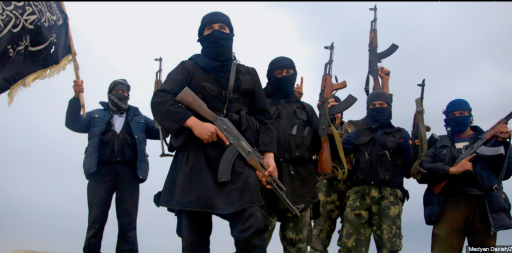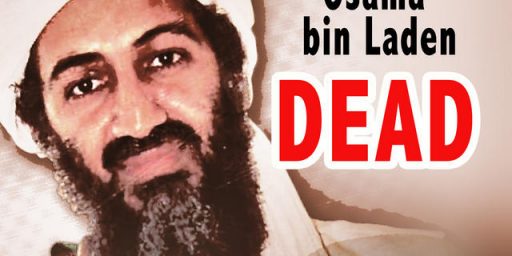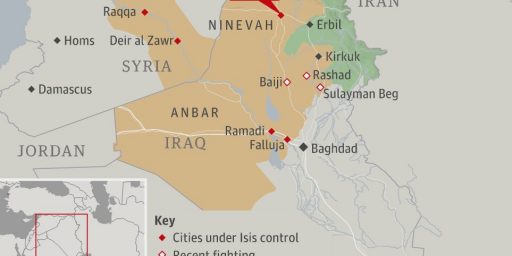Caliphate An Effective Description of Al Qaeda Goals
Elisabeth Bumiller discovers that the administration has seized upon a “new” buzzword to bring home the need for the war against Islamist terrorists in Iraq and elsewhere.
21st-Century Warnings of a Threat Rooted in the 7th (NYT)
Defense Secretary Donald H. Rumsfeld said it in a speech last Monday in Washington and again on Thursday on PBS. Eric S. Edelman, the under secretary of defense for policy, said it the week before in a round table at the Council on Foreign Relations. Stephen J. Hadley, the national security adviser, said it in October in speeches in New York and Los Angeles. Gen. John P. Abizaid, the top American commander in the Middle East, said it in September in hearings on Capitol Hill. Vice President Dick Cheney was one of the first members of the Bush administration to say it, at a campaign stop in Lake Elmo, Minn., in September 2004. The word getting the workout from the nation’s top guns these days is “caliphate” – the term for the seventh-century Islamic empire that spanned the Middle East, spread to Southwest Asia, North Africa and Spain, then ended with the Mongol sack of Baghdad in 1258. The term can also refer to other caliphates, including the one declared by the Ottoman Turks that ended in 1924.
Specialists on Islam say the word is a mysterious and ominous one for many Americans, and that the administration knows it. “They recognize that there’s a lot of resonance when they use the term ‘caliphate,’ ” said Kenneth M. Pollack, a former Central Intelligence Agency analyst and now a scholar at the Saban Center at the Brookings Institution. Zbigniew Brzezinski, President Jimmy Carter’s national security adviser, said that the word had an “almost instinctive fearful impact.”
So now, Mr. Cheney and others warn, Al Qaeda’s ultimate goal is the re-establishment of the caliphate, with calamitous consequences for the United States. As Mr. Cheney put it in Lake Elmo, referring to Osama bin Laden and his followers: “They talk about wanting to re-establish what you could refer to as the seventh-century caliphate” to be “governed by Sharia law, the most rigid interpretation of the Koran.” Or as Mr. Rumsfeld put it on Monday: “Iraq would serve as the base of a new Islamic caliphate to extend throughout the Middle East, and which would threaten legitimate governments in Europe, Africa and Asia.” General Abizaid was dire, too. “They will try to re-establish a caliphate throughout the entire Muslim world,” he told the House Armed Services Committee in September, adding that the caliphate’s goals would include the destruction of Israel. “Just as we had the opportunity to learn what the Nazis were going to do, from Hitler’s world in ‘Mein Kampf,’ ” General Abizaid said, “we need to learn what these people intend to do from their own words.”
A number of scholars and former government officials take strong issue with the administration’s warning about a new caliphate, and compare it to the fear of communism spread during the Cold War. They say that although Al Qaeda’s statements do indeed describe a caliphate as a goal, the administration is exaggerating the magnitude of the threat as it seeks to gain support for its policies in Iraq.
In the view of John L. Esposito, an Islamic studies professor at Georgetown University, there is a difference between the ability of small bands of terrorists to commit attacks across the world and achieving global conquest. “It is certainly correct to say that these people have a global design, but the administration ought to frame it realistically,” said Mr. Esposito, the founding director of the Center for Muslim-Christian Understanding at Georgetown. “Otherwise they can actually be playing into the hands of the Osama bin Ladens of the world because they raise this to a threat that is exponentially beyond anything that Osama bin Laden can deliver.”
I’m surprised that the term has such resonance but it is in fact quite descriptive of the aims of al Qaeda and other Islamist terrorists. The word accurately conveys their goals and, more importantly, their fanatical zeal. It is really irrelevant that reaching that goal is unrealistic so long as the terrorists disagree. The goals motivating the 9/11 hijackers were fantastical too, but it didn’t stop them from killing thousands in their vain quest to roll back history.





UBL has made this very clear in his writing. It is also behind his pledge to Mullah Omar as the “Leader of the Faithful” (another term for Caliph).
You’re absolutely right that whether or not UBL’s goals are realistically achievable is immaterial. This is the problem Brzesinski had in his opinion piece last week.
Some of the “insurgents” or terrorists have realistic goals that can be achieved by political means. They use terror as a tactic to try to pressure people and states to their ends.
UBL has a goal that is not achievable in this world: the conversion of all mankind to his concept of Islam. His use of terror is both tactical and strategic, killing all those who oppose him, casting out of Islam (and thus making them legitimate targets of terror) those who do not buy into his concept. He sees the war truly as a clash of civilizations. His war is more eschatological than reality based.
Esposito is right that it’s not helpful to conflate all terror into one basket. The different sources need different responses. The only response to UBL is to put him and his cohorts completely out of circulation. With others, there’s room to negotiate political solutions to the demands.
Good comment, Mr. Burgess.
What do you call an advocate of restoring the Caliphate? A caliphist? I hope not.
We need a word, though Rumsfeld will then extend it to every insurgent in Iraq for propaganda purposes …
I think a useful term is “neo-Salafist,” a term introduced by Anthony Cordesman of CSIS to distinguish between the people who buy into UBL’s message and those fundamentalist, even extremist, Muslims who are Salafist or Wahhabi. The latter two have a majority who are not interested in violence as a method, although they may share a dream of a caliphate achieved through universal conversion.
“Neo-Salafist” also includes the South Asian branch of fundamentalism–Deobandism–which is far more likely to take to the streets, bomb Shi’a mosques, and generally follow the most extreme patterns available. The Taleban, for example, were self-identified as Deobandi.